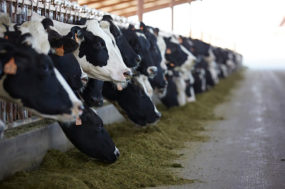March 31 marked the end of the five-year Dairy Research Cluster 2 program managed by Dairy Farmers of Canada (DFC).
Six new fact sheets are available online at dairyresearch.ca to showcase key outcomes and success stories from DFC investments in the program as well as listings of all ongoing dairy research projects in dairy production, human nutrition and health, and genetics and genomics funded in part by DFC.
In 2017-2018, DFC leveraged $1.7 million in research investments to create a total research value of $7.8 million to drive innovation in the Canadian dairy sector.
DFC and its council, called the Canadian Dairy Research Council (CDRC), oversaw 46 research projects with 15 research partners under five research programs.
About 80 scientists worked on those dairy research projects, with 80 students training in a range of dairy science programs in nine federal research centres and 15 Canadian universities.
The following are a few extracts of the benefits of DFC research investments to the dairy sector presented in the 2017-2018 Dairy Research Highlights:
Key outcomes: Rapid advances in genetics and genomics research produce tools for farm profitability
- Dairy farmers have immediate access to more accurate national genomic evaluations produced by the Canadian Dairy Network (CDN), providing them with information to select the best bulls and cows for their dairy operations.
- Two powerful tools were developed to help improve hoof health in Canadian herds: the genomic evaluation for digital dermatitis was launched by CDN in December 2017, and a new management report through Canadian DHI will soon be available for farmers to better manage hoof health.
Key outcomes: Canadian dairy farmers are leading in sustainability
- A new methane emission factor calculated by a team of scientists demonstrated Canadian dairy cows emit less methane than reported in the national GHG inventories.
The new factor of 5.79 percent of methane energy losses, compared to the default factor of 6.5 percent used by the Intergovernmental Panel on Climate Change, will serve as the basis for the 2019 national inventories for the calculation of enteric methane emissions from dairy cows in Canada.
- Research results can be immediately applied to reduce the water footprint of dairy farms by reducing water use and nutrient outflows on any Canadian dairy operation.
Key outcomes: Tools and new technologies for more comfortable and healthier cows
- A simplified and practical tool to assess cow comfort was created, reducing usual assessment times by approximately 50 percent (or about three hours), depending on the herd.
- Quarter-based selective dry cow therapy can now be implemented on farms without negative impacts on udder health to reduce the use of antimicrobials by an average of 60 percent.
- A new mobile application is in the final stage of development and focuses on udder health and improved udder health management for mastitis prevention.
Key outcomes: Strong science-based evidence supports the role of dairy in Canadians’ diets
- Strong evidence was produced supporting the lack of an adverse association between dairy fat consumption, in the form of cheese and butter, and risk of heart disease, highlighting the importance of whole foods, not just individual nutrients, when developing dietary guidelines for the population.
- New Canadian data was generated and demonstrates diets containing dairy products can reduce the risk of metabolic syndrome, cardiovascular disease and type 2 diabetes.

For more information:
Dairy Research Portal
On Twitter: @dairyresearch
On Facebook: Dairy Research Cluster@dairyresearch
Dairy Farmers of Canada (DFC) is the national policy, lobbying and promotional organization representing Canada’s farmers. DFC works to support sustainable dairy production; facilitate solutions to provincial/national challenges; provide credible research of dairy products on a national basis; and create innovative ways to grow the market.








